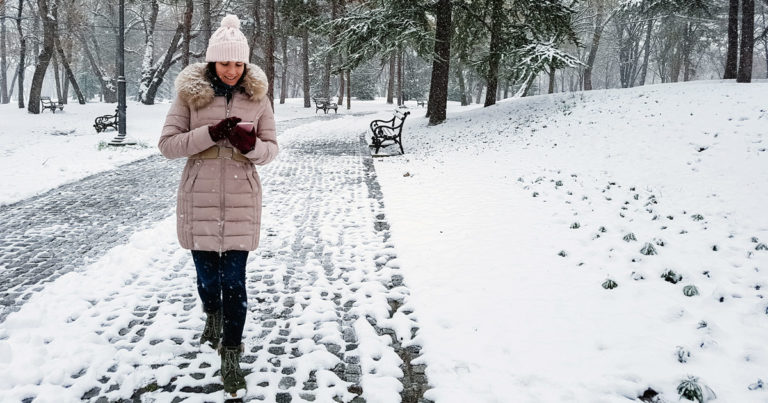Tips to Prevent Winter Injury: Slips and Falls
- Category: General
- Posted On:

Winter is here, and with it comes snow, ice, and slippery conditions. During the winter months, the most common accidents, including slips, trips, and falls, happen frequently thanks to the dangerous conditions created by cold, wind, snow, and ice.
While most winter falls result in only minor injuries such as bumps and bruises, we often see patients who suffer more serious winter injuries from falling or slipping such as broken bones. By preparing and working to prevent winter injury you can greatly minimize your risk.
How to Prevent a Winter Injury

The best way to fight injuries are to prevent them ever happening in the first place. Here are some tips to prevent those nasty winter slips and falls.
- Wear appropriate footwear. Shoes that provide traction on snow or ice are important. Rubber soles and boots or shoes with grip and texture can help keep you stable on ice and snow. Make sure your shoes fit properly and have low, wide heels. Avoid plastic or leather soles.
- Keep your hands free! In cold weather, wear gloves to help keep your hands warm and out of your pockets. This way if you should fall you can better catch yourself using your hands or arms. Don’t get distracted with a cell phone while walking in icy conditions.
- Take smaller, shorter steps when walking for stability. In slippery conditions, walk slowly using small, short steps. If conditions are extra slippery, try shuffling along slowly without picking up your feet, in a gliding type motion. If snow or grass is available walk on these textured surfaces instead of on slippery walk ways.
- Use handrails if available. Having something stable to hold on to can make a big difference should you slip. If you use a cane on occasion, it would be advised to use your cane in cold/icy weather to provide better stability.
- Step down, not out, from your vehicle. When getting out of a vehicle, swing both legs out and place both feet flat on the ground before getting up. Using both feet will give you more stability than just one foot.
- Plan ahead. Give yourself plenty of time to get where you’re going. When you’re running in a rush, chances of falling increase.
- Watch for slippery floors inside. In winter all kinds of water and ice can be found inside near entryways. Show caution and enter any building or your home by first taking a moment to look down to see if there is any hazard.
What To Do if You Fall
If you fall, no matter if it is forwards or backwards, try to allow your arms and hands to catch you. It is important to protect your head and if you fall backwards, tuck your head upwards. Let go of any objects you are carrying — protect yourself instead.
After the fall, check yourself for injuries. If you’re hurt or unable to get up, yell for help. If your cell phone is easy to reach, call for help on your phone. Do not try to get up by yourself as you could cause further injury by having another slip or fall.
If you’re not hurt or feel well enough, you should try to get up from the ground as safely as possible. Try to roll onto your side and slowly pull yourself up so that you’re on your hands and knees. Crawl towards a sturdy object that can support you as you try to get up, such as a solid chair, stairs, or a tree. Sit and rest for a few minutes before you try to do anything else.
When to See a Medical Professional After a Slip or Fall
In the absence of a medical emergency, most of the pain after a fall will be due to inflammation.
“I use pain, bruising, and swelling as a guide. ”Recommends Dr. Thomas Atkins. “Tenderness if you push on it. Ability to move is not a good indicator. If you can’t move, you clearly have a problem. But most people with a fracture can still move a little, and some can move a lot.”
“Slip and falls should come in right away if they can’t walk on it or the pain isn’t controlled with ice and NSAIDs/ Tylenol” says Dr. Eric Bartel. “Swelling is important to watch for too.”
If you suspect you have a broken bone, see a doctor or physician assistant immediately. Fox Valley Orthopedics' walk-in clinic is open 6 days a week for such injuries. Learn more about OrthoFirst, our walk-in clinic that provides same-day care.

.1).jpg)
.jpg)
